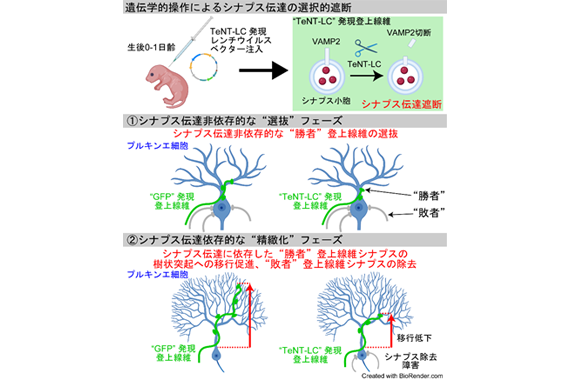トピックス
- 教育・研究
2025年08月26日
- プレスリリース
狩野特任教授が、シナプス伝達は“勝者”の選別には不要だが配線の“精緻化”には不可欠であることを発見しました板橋キャンパス
2025年8月26日(火)、帝京大学先端総合研究機構特任教授 狩野方伸(東京大学大学院医学系研究科 名誉教授)、東京大学大学院医学系研究科研究員(研究当時)Kao Tzu-Huei氏、帝京大学先端総合研究機構研究員研究員 奥野優人、東京大学大学院医学系研究科講師(研究当時、現東京科学大学医歯学総合研究科教授)上阪直史氏らの研究グループは、小脳において、運動制御だけでなく社会性や認知機能を担うプルキンエ細胞にシナプス入力する登上線維が、発達の初期段階でどのように「勝ち残り」、その後どうやって不要な線維を取り除いて大人の神経回路を完成させるのかを明らかにしました。
生まれた直後のマウスのプルキンエ細胞は、5本以上の登上線維からシナプス結合を受けています。従来は、これらの複数の登上線維のうち、プルキンエ細胞に対して「強いシグナル(シナプス伝達)を送ることができる線維が“勝者”として勝ち残り、弱いシグナルしか送れない線維は“敗者”として排除される」と考えられてきました。この仮説を検証するため、本研究では一部の登上線維から神経伝達物質(グルタミン酸)の放出を遺伝学的に阻害して、プルキンエ細胞にシグナルを送ることができないようにした際、発達期の小脳の神経回路形成がどのように影響されるかを調べました。
その結果、シナプス伝達がなくても初期段階の“勝者”のselection(選抜)は起こり得ることを示しました。一方で、選抜された登上線維がプルキンエ細胞の樹状突起とシナプス結合する領域を拡大し、ほかの線維を排除して最終的な配線を仕上げるrefinement(精緻化)にはシナプス伝達が必須であり、これを阻害すると未熟な配線が長期にわたり残存することが確認されました。
この結果は、発達期の神経回路形成は、(1)シナプス伝達を必要としない「選抜」フェーズと、(2)シナプス伝達に依存する「精緻化」フェーズという二段階で進むことを示唆します。これは、発達障がいや運動失調症など、神経回路の微細な異常がかかわる疾患の理解・治療標的探索に新しい視点を提供します。すなわち、まずシナプス伝達とは関係なく勝ち残る神経線維が選ばれ、その後にシナプス伝達に依存するメカニズムによって配線を磨き上げるという「分業制」の存在を、実験的に裏づけた点に本研究の最大の意義があります。
本研究成果は2025年8月22日(金)4時(日本時間)に「Proceedings of the National Academy of Sciences of the United States of America」に掲載されました。
プレスリリースについてはこちら
掲載論文はこちら
狩野教授についてはこちら

